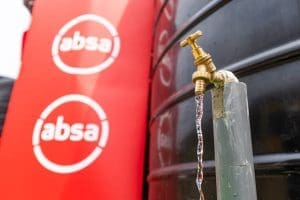Absa Bank Ghana’s Water for Life initiative has delivered clean water access to approximately 37,000 people across all 11 regions through 21 strategically placed boreholes, transforming daily routines and economic opportunities in underserved communities.
The project reached completion of Phase II in August 2025, bringing the total number of boreholes to 21, with each installation selected based on community need rather than geographic convenience. The initiative operates under Absa’s Force for Good agenda, targeting areas where water scarcity disrupts education, healthcare, and local economies.
In Abiriw, Eastern Region, the transformation proves dramatic for families like Sarfoa’s, whose daily routine previously began before dawn when her son walked to distant water sources. The journey often made him late for school in Akropong, an hour’s walk away, while forcing her business to open late due to water collection delays.
“Long queues at the borehole were common, and as a result, her son often arrived late for school and her business often opened late,” community members explained, describing how water scarcity governed every household decision and emergency plan.
Kwadjo Darko, known locally as Dokono Wura Ba, previously paid people to fetch water for his kenkey business when municipal pipes failed. Households routinely woke at 3:30am to avoid queues or purchased water at three Ghana cedis per gallon, sometimes requiring ten gallons daily. The new nearby borehole has reduced his operational costs while eliminating wasted time.
The coastal Nungua installation required additional engineering due to saline groundwater conditions. At LEKMA Polyclinic, the project installed a reverse osmosis system alongside the borehole to remove salts and impurities, ensuring safe water for medical procedures and community use.
Dr. William Frimpong, LEKMA Polyclinic’s Medical Superintendent, emphasized the clinical importance of reliable water access. “This intervention ensures a consistent water supply, supports sterile medical environments and saves the clinic the cost of purchasing water,” he noted, describing the installation as vital for patient and staff welfare.
Dr. Agnes Naa Momo Lartey, Member of Parliament for Krowor, welcomed the health facility placement. “Water is life, and by choosing to enter Krowor with the gift of water, Absa has entered the heart of our community, where life is created and preserved,” she stated during the commissioning ceremony.
The economic impact extends beyond individual households to community-wide improvements. Regular school attendance increases when children no longer miss classes due to water collection duties. Small businesses maintain consistent operating hours, while parents arrive at work punctually without water-related delays.
Healthcare outcomes improve significantly at facilities like LEKMA, where water reliability underpins sterile practices, infection control, and predictable work schedules. Clinical staff can plan procedures with confidence when basic utilities remain dependable.
The project represents the Social Impact Response Pillar of Absa’s Force for Good agenda, selecting sites based purely on community need rather than commercial considerations. A coastal clinic in Accra and rural settlements outside Sunyani both qualify for identical support based on water access challenges.
Priscilla Yeboah, Absa Bank Ghana’s Head of Citizenship, emphasized the partnership approach underlying the initiative. “Water for Life is built on partnership. Our role is to help close those gaps with practical solutions, selected based on need and sustained with local ownership,” she explained.
The project addresses a fundamental development challenge where progress requires coordination between public authorities, private organizations, and communities. Ghana continues expanding water infrastructure, but the scale of need demands collaborative efforts to accelerate access in underserved areas.
Communities report multiple benefits beyond water access itself. Money previously allocated for water purchases or transport can be redirected to other needs. Shops and kiosks maintain regular hours without water-related closures, while reduced stress improves overall quality of life for affected families.
The initiative demonstrates how targeted corporate social responsibility can create measurable community impact. Rather than dramatic infrastructure projects, the Water for Life approach focuses on practical solutions that restore normalcy to daily routines disrupted by basic utility shortages.
For residents like Sarfoa and Kwadjo Darko, early morning routines continue, but now represent choice rather than necessity. The transformation reflects how sustainable development often occurs through restoring everyday life to function as it should, one community at a time.
Source: newsghana.com.gh











